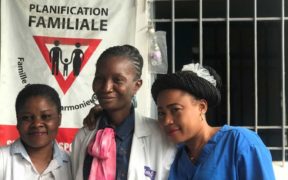Author:
Natasha Mack
Science Writer, Research Utilization, FHI 360
Natasha Mack is a science writer in the Research Utilization division at FHI 360. After previously working as a qualitative researcher in international public health for more than 16 years, she now writes about the topics she used to research: voluntary family planning, HIV, gender, key populations, nutrition, sexual and reproductive health, and youth. Mack holds a doctorate in linguistic and cultural anthropology from the University of Arizona.

In Kinshasa, Democratic Republic of Congo, more than a quarter of women have unmet need for voluntary family planning, affecting both their educational and economic opportunities—and their health. The Masculinité, Famille, et Foi project has sought to shift social norms to support the use of voluntary family planning among young couples in the city.
Listen to “Inside the FP Story”
Grab a cup of coffee or tea and listen in on honest conversations with family planning program experts around the world as they share what has worked in their settings — and what to avoid — in our podcast series, Inside the FP Story.
Click on the image above to visit the podcast page or on your preferred provider below to listen to Inside the FP Story.
Stay Updated
with the latest trending news
About
Knowledge SUCCESS is a five-year global project led by a consortium of partners and funded by USAID’s Office of Population and Reproductive Health to support learning, and create opportunities for collaboration and knowledge exchange, within the family planning and reproductive health community.
Contact
Johns Hopkins Center for Communication Programs
111 Market Place, Suite 310
Baltimore, MD 21202 USA
Contact Us
This website is made possible by the support of the American People through the United States Agency for International Development (USAID) under the Knowledge SUCCESS (Strengthening Use, Capacity, Collaboration, Exchange, Synthesis, and Sharing) Project. Knowledge SUCCESS is supported by USAID’s Bureau for Global Health, Office of Population and Reproductive Health and led by the Johns Hopkins Center for Communication Programs (CCP) in partnership with Amref Health Africa, The Busara Center for Behavioral Economics (Busara), and FHI 360. The contents of this website are the sole responsibility of CCP. The information provided on this website does not necessarily reflect the views of USAID, the United States Government, or the Johns Hopkins University. Read our full Security, Privacy, and Copyright Policies.













